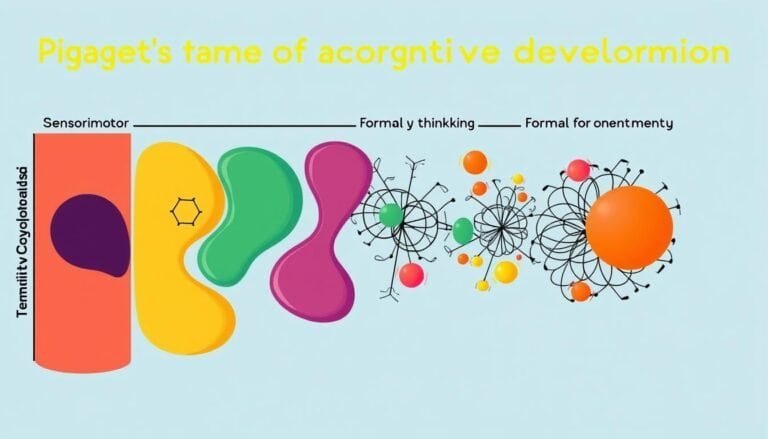Albert Bandura: The Power of Self-Efficacy
“Whether you think you can, or you think you can’t – you’re right.” This quote by Henry Ford highlights the power of self-efficacy. Albert Bandura, a pioneer, changed how we see human behavior and mental strength.
In 1977, Bandura brought up self-efficacy in his social cognitive theory. This idea shows how our beliefs about our abilities affect our actions and results. Self-efficacy is key in many life areas, from school to career success.
Bandura found that people with high self-efficacy set big but achievable goals. They keep going when faced with obstacles and use smart ways to cope. This attitude builds resilience and improves performance in many areas.
Self-efficacy’s impact goes beyond personal growth. It shapes how we tackle tasks, handle stress, and bounce back from failures. Learning and building self-efficacy can greatly change our lives at work and at home.
Introduction to Albert Bandura and Self-Efficacy
Albert Bandura, a leading psychologist, introduced self-efficacy theory in 1977. This idea changed how we see personal power and changing behavior. Self-efficacy is about believing in one’s ability to do tasks and reach goals.
Who is Albert Bandura?
Albert Bandura is a famous psychologist who has greatly influenced psychology. His work on self-efficacy is part of his social cognitive theory. This theory has led to thousands of studies across many fields.
Definition of Self-Efficacy
Self-efficacy is about believing in one’s ability to do specific tasks. It’s different from general self-esteem because it’s task-focused. It’s about believing you can succeed in certain situations.
Importance in Psychology and Personal Development
Self-efficacy is very important in psychology and personal growth. It affects:
- Choice of activities
- Effort on tasks
- Persistence when facing obstacles
- Setting and achieving goals
People with high self-efficacy set big goals and see tough tasks as chances to grow. They keep trying and come back after failures. This mindset helps with personal growth and success in life.
| High Self-Efficacy | Low Self-Efficacy |
|---|---|
| Set challenging goals | Avoid challenging tasks |
| View failures as learning opportunities | Focus on personal failings |
| Approach difficult tasks confidently | Doubt their capabilities |
| Exhibit resilience | Give up easily |
Understanding and building self-efficacy can greatly improve personal power, behavior change, and goal-setting. It helps people face challenges with more confidence and resilience. This leads to better well-being and success overall.
The Origins of Self-Efficacy Theory
Albert Bandura’s self-efficacy theory came from his groundbreaking work on social learning theory. His famous “Bobo doll” experiments showed that we can learn by watching others. This led to a new way of thinking about how we pick up new behaviors.
Self-efficacy theory says our beliefs about our abilities greatly affect how we act and what motivates us. It challenged old views that saw humans as just machines. Instead, it showed the key role of our thoughts and actions in shaping our behavior.
Bandura said self-efficacy comes from four main sources:
- Mastery experiences (doing things successfully)
- Vicarious experiences (watching others succeed)
- Social persuasion (getting encouragement)
- Emotional and physical states (feeling good)
This theory has greatly influenced psychology and personal growth. It’s changed how we view learning, motivation, and success. By focusing on our beliefs in our abilities, Bandura introduced new ways to help people reach their full potential.
Four Sources of Self-Efficacy
Albert Bandura found four main sources that shape our confidence in our abilities. These sources help build our self-efficacy in various life areas.
Mastery Experiences
Performance accomplishments are the top source of self-efficacy. When we do well at tasks, our confidence grows. This makes us more ready to face similar challenges later.
Vicarious Experiences
Seeing others succeed can boost our confidence. It’s especially true when we see people like us reach their goals. These experiences show us what we can do and motivate us to try harder.
Social Persuasion
Words of encouragement from others can make us believe in ourselves more. Support from friends, family, or mentors helps us beat self-doubt and push ourselves. Positive feedback also makes us feel more capable.
Emotional and Physiological States
Our mood, stress, and physical feelings affect how we see our abilities. Learning to manage these can boost our self-efficacy. By seeing our body’s signals as positive, we can feel more confident in tough situations.
Studies show that doing well in tasks has a big impact on building self-efficacy. A study with German teachers found that success in teaching boosted their confidence. This effect was stronger for advanced students in their teaching practice.
Albert Bandura: The Power of Self-Efficacy
Albert Bandura, a Canadian American psychologist, changed how we see human motivation. He focused on self-efficacy, a key idea in psychological resilience. This idea helps us grow and achieve our goals.
Self-efficacy is different from self-confidence. It’s about believing in our ability to overcome challenges and do well in tasks. It’s a key part of motivation theory. It shapes how we think, feel, and act in different situations.
- Mastery experiences
- Vicarious experiences
- Verbal persuasion
- Emotional and physiological states
Having high self-efficacy means we try harder, keep going, and bounce back stronger when faced with challenges. It’s not something we’re born with. We can build it over time, making it a key tool for personal growth.
“Success is the ability to go from one failure to another with no loss of enthusiasm.” – Winston Churchill
This quote shows what self-efficacy is all about. It’s about keeping faith in ourselves, even when things don’t go well. For example, students who excel in tough subjects or entrepreneurs who keep going after failures show high self-efficacy.
In the workplace, self-efficacy is very important. If someone feels they can’t do their job well, they might not learn much, won’t bounce back from setbacks, and could feel anxious. But, companies that help build self-efficacy often see their workers do better and have a better work environment.
| Factor | Impact on Self-Efficacy |
|---|---|
| Past Performance | Builds confidence in abilities |
| Observing Others | Inspires belief in own potential |
| Verbal Support | Boosts self-belief and motivation |
| Physiological Effects | Influences perception of capabilities |
Building self-efficacy is a journey of personal growth. It’s key for building psychological resilience and doing well in different areas of life.
Self-Efficacy and Human Functioning
Self-efficacy is key to how we act and perform. It’s part of motivation theory. It affects how we tackle tasks, set goals, and keep going when things get tough.
Impact on Choice of Activities
Those with high self-efficacy go for tough tasks. They see hard situations as chances to grow, not threats to dodge. This mindset opens up more experiences and achievements.
Influence on Effort and Persistence
How much effort we put into things depends on our self-efficacy. Strong self-efficacy means we keep going when obstacles come up. This grit often leads to better achievements in many areas.
Role in Goal-Setting and Achievement
Setting goals is shaped by self-efficacy. High self-efficacy means setting big goals and sticking to them. This active goal-setting can boost performance and personal growth.
| Self-Efficacy Level | Choice of Activities | Effort and Persistence | Goal-Setting |
|---|---|---|---|
| High | Challenging tasks | High effort, persistent | Ambitious goals |
| Low | Easy tasks | Low effort, quick to give up | Conservative goals |
Studies prove self-efficacy links to school success, career achievements, and happiness in life. By boosting self-efficacy, people can do better and reach their goals in different areas.
Building Self-Efficacy: Practical Strategies
Building strong self-efficacy is crucial for personal growth and changing your behavior. Setting goals that you can reach helps you feel more confident. This is because you get to see your skills grow through these achievements.
Looking up to positive role models can really help too. Seeing others do well in tasks like yours can make you believe in your own abilities more. This is very important for women in their careers, as they might not often see successful women to look up to.
Talking kindly to yourself and changing negative thoughts helps a lot too. When others encourage you in a real way, it can make you feel more capable. Teachers play a big part in this for students, by giving them positive feedback.
Handling stress and anxiety with relaxation can also boost your self-efficacy. Feeling good emotionally helps you believe in yourself more. But feeling anxious can make you doubt your abilities.
| Strategy | Impact on Self-Efficacy |
|---|---|
| Setting achievable goals | Creates mastery experiences |
| Seeking role models | Provides vicarious experiences |
| Positive self-talk | Reinforces verbal persuasion |
| Stress management | Improves emotional state |
Using these strategies can help you grow your self-efficacy. This will improve your personal growth, school success, and career advancement.
Self-Efficacy in Various Domains
Self-efficacy is key in many life areas. It shapes our beliefs about our abilities. It also affects our actions in school, work, and health.
Academic Self-Efficacy
In school, self-efficacy changes how students do. Those who believe in themselves set big goals and keep going when things get tough. A study showed that students who saw four self-efficacy features did better and felt less anxious than others.
Career Self-Efficacy
Career self-efficacy helps in choosing and doing a job. People who believe in their work skills go for tough careers and do well. This fits with motivation theory, as believing in oneself pushes people to reach big goals at work.
Health-Related Self-Efficacy
In health, self-efficacy affects how we act and recover. Those who believe in their health skills are more likely to make healthy choices and stick to their treatment plans. This shows they can bounce back from health issues.
Studies prove that believing in oneself in specific areas predicts success better than just feeling good about oneself overall. By boosting self-efficacy in these areas, people can do better in life and feel happier.
| Domain | Impact of High Self-Efficacy |
|---|---|
| Academic | Improved transfer skills, reduced anxiety |
| Career | Pursuit of challenging careers, better job performance |
| Health | Adoption of healthy habits, better treatment adherence |
Criticisms and Limitations of Self-Efficacy Theory
Self-efficacy theory is a key part of social cognitive theory. It has shaped how we study psychology and change behavior. Yet, it has its critics.
One big issue is how accurate people are when judging their own abilities. Sometimes, they think they can do more or less than they really can. This makes us wonder if we can trust what people say about their self-efficacy.
Another problem is figuring out if self-efficacy really affects how well people perform. Some experts believe that how motivated someone is can influence their self-efficacy ratings. This challenges the theory’s main idea.
Also, culture can affect how people see their own self-efficacy. The idea of self-confidence might not work the same way everywhere. This makes the theory less universal.
“Self-efficacy is a robust predictor of various health behaviors, but its measurement and interpretation require careful consideration.”
Even with these issues, self-efficacy is still important for changing behavior. Adding more factors to the theory could help us better understand what drives us.
| Aspect | Limitation |
|---|---|
| Measurement | Accuracy of self-reported data |
| Causality | Unclear direction of influence |
| Cultural Relevance | Varying importance across cultures |
| Comprehensiveness | Focus on individual beliefs over external factors |
Conclusion
Albert Bandura’s self-efficacy theory changed how we see motivation and personal power. It started in 1977 and is now a key part of psychology. It helps us understand how our belief in ourselves affects our actions in life.
Studies show that self-efficacy changes with different areas like school, solving problems, and controlling ourselves. When we believe in our abilities, we do better in school, sports, and even in keeping healthy. This shows why building self-confidence is key to bouncing back from tough times.
Even with some criticisms, the self-efficacy theory is still very important for personal growth. It gives us ways to boost our potential and resilience. As we learn more about it in different cultures and situations, it will keep helping us understand why we do what we do.
Source Links
- Empowering Patients: The Power of Self-Efficacy in Rehabilitation from Injury
- Tero Article | Self-Efficacy: The Power of Believing in Oneself to Succeed
- Guest opinion: The power of self-efficacy – Business Record
- No title found
- The Power of Self-Efficacy: A Catalyst for Personal Growth
- The Importance of Albert Bandura’s Concept of Self-efficacy in Achieving Success
- Self-Efficacy: Bandura’s Theory Of Motivation In Psychology
- Self-efficacy
- Albert Bandura: Self-Efficacy & Agentic Positive Psychology
- The four sources of self-efficacy you draw on every day | Robertson Cooper
- Why Do I Feel More Confident? Bandura’s Sources Predict Preservice Teachers’ Latent Changes in Teacher Self-Efficacy
- The Power of Self-Efficacy
- The Power of Self-Efficacy
- Albert Bandura’s Theory of Self-Efficacy
- Academic self-efficacy: from educational theory to instructional practice
- How Self Efficacy Helps You Achieve Your Goals
- Self-Efficacy Teaching Tip Sheet
- 4 Ways To Improve And Increase Self-Efficacy
- Self-Efficacy
- What Is Self-Efficacy Theory? (Incl. 8 Examples & Scales)
- Better together: Effects of four self-efficacy-building strategies on online statistical learning
- The Confounded Self-Efficacy Construct: Review, Conceptual Analysis, and Recommendations for Future Research
- Is Self-Efficacy the Sole Determinant of Motivation and Behavior? Exploring Limitations and the Need for a Comprehensive Perspective in Organizational
- Social and Cultural Meanings of Self-Efficacy
- Self-Efficacy







